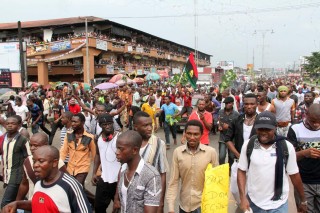“Three years ago, Nnamdi Kanu was just another run-of-the-mill hate radio DJ who hugged a saliva drenched microphone for a living,” wrote Jude Egbas in Pulse.ng. He couldn’t be more correct. Fast forward through unwise government prosecution, clicks-hungry media fascination and painful gullibility of a section of the public, the former UK-based One Nigeria Campaigner is now trying to tear the country apart via his new posture as the Moses-Jesus of the Igbos set to lead them to a Biafran promised land. However, what the Igbos desperately need is not the cult-worship of a vile and hate spewing demagogue, but real and inclusive socio-economic development of the south-east region. Sadly, the media is too busy focusing on Kanu rather than advocating the former.
Media houses now effectively wait on Kanu’s mouth for something, anything, to come out. And once it does, they run to spread it across the airwaves, regardless of how vile and destructive it is. All this front-page coverage of Kanu’s idiosyncrasies range from his “declaration” that there will be no election in the south-east, except for his self-willed imposition of a referendum for Biafran independence, to the fetishizing of his “pilgrimage” to a shrine in Anambra.
Kanu’s statements and actions, clearly unrepresentative of the totality of the views of Igbos at home and abroad, and bereft of any legal or moral authority, is still being spread online and in print as if they are declarations of some real consequence. But, the main reason journalists and bloggers jump on Kanu’s diatribe is because it sells. Now, more than ever, to prevent the further heightening of tribal divisions and to stem the growth of fascist anarchism, we have to call our media houses to order. Rather than hang on every incendiary remark and ludicrous gesture made by Nnamdi, such quality press time and space is best spent on the real issues facing the south-east, the Igbos and Nigerians in general.
Atop the issues facing the south-east is the worsening lack of opportunity. For a region whose people are famed for their enterprising nature, much of Igbo land is scant of entrepreneurial opportunities and surfeit with jobless citizens. Trade hubs such as Aba and Onitsha are increasingly relics of their illustrious while thriving industries are almost as common as asteroids, thanks to the incoherence of government policies and ineptitude of political leaders. So, when the young and old leave the east every day in their thousands, it isn’t as much about the sojourner trait in the Igbo people as it is about the barren state of opportunities in the homeland.
As the economic opportunity in the south-east has gone down, the spate of crime has risen to alarming levels. It’s increasingly difficult to meet someone who doesn’t personally know a victim of kidnapping. Armed robberies remain prevalent while drug trafficking and financial frauds are now, more or less, the most attractive career paths for young people; educated and non-educated alike. More highway patrols have not led to greater security, and that’s because governments are not only failing to spur their citizens to thrive, it is making the livelihoods of many worse through the delay or non-payment of salaries, pensions and other benefits to civil servants.
For a region where everything has seemingly gone wrong, it is difficult to mention all the burning issues in one breath. But the infrastructural dilapidation of the south-east is one that must always get a shout-out. Infrastructural development is the foundation of any thriving society, but it is absent in the south-east. Everything, from roads and airports to schools and hospitals, are all in a state of so much disrepair, it’s almost as if they aren’t even there. And while this is a national problem, the region arguably has it the worst, collectively put down by marked federal neglect and the state’s abdication of their responsibilities. For demagogues like Nnamdi Kanu, the solution to these problems is a cassava republic with him as supreme leader, but his solution cannot stand common sense or any basic understanding of the region’s challenges.
What the Southeast needs to triumph over its motley challenges is a well-thought, inclusive and pragmatic socio-economic plan that leverages the region’s strengths—the people’s zest for entrepreneurship and education, the abundance of agricultural potential in their lands and the existence of scalable trade and manufacturing hubs—and ameliorates its weaknesses, particularly the grave infrastructural inadequacies. This is what governments at all levels should focus on creating and delivering for the south-east, it is also what the media in all its forms should discuss and advocate, not their current obsession with Nnamdi Kanu.








